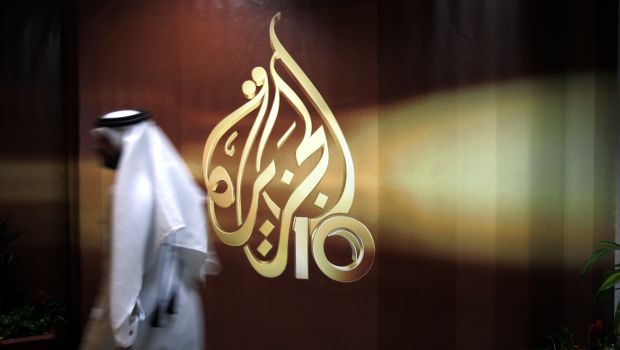
In this Wednesday, November 1, 2006 file photo, a Qatari employee of the Al-Jazeera Arabic-language TV news channel passes by the logo of Al-Jazeera in Doha, Qatar. (AP Photo/Kamran Jebreili, File)
Cairo and Riyadh, Asharq Al-Awsat—Al-Jazeera Mubasher Misr, the controversial Qatari-owned channel that covers Egyptian news and which has been banned in the country, announced that it would be suspending its broadcast on Monday following an easing of diplomatic tensions between Cairo and Doha.
Al-Jazeera Media Network, the channel’s parent company, issued a statement confirming that Al-Jazeera Mubasher Misr has “temporarily ceased broadcasting until such time as necessary permits are issued for its return to Cairo in coordination with the Egyptian authorities.”
Following the ouster of Islamist President Mohamed Mursi, Al-Jazeera Mubasher Misr took a strong pro-Muslim Brotherhood editorial line, describing pro-Mursi protests as being “pro-democracy” and dismissing the post-Mursi authorities as being part of a military coup. Authorities in Egypt shut down the Cairo offices of the Qatari-funded channel in July 2013, accusing it of inciting chaos and unrest.
Al-Jazeera’s surprising decision to take the channel off air comes just two days after Egyptian President Sisi received Sheikh Mohammed Bin Abdul Rahman Al Thani, special envoy of the Emir of Qatar, in Cairo on Saturday. The meeting marked a major shift in ties between Doha and Cairo with sources informing Asharq Al-Awsat that Sisi and the Emir of Qatar, Sheikh Tamim Bin Hamad Bin Khalifa Al Thani, are set to meet in the near future to cement the diplomatic rapprochement.
The easing of tensions between Cairo and Doha comes following broad-ranging reconciliation efforts by Saudi Arabia, sources told Asharq Al-Awsat.
A high-level Egyptian official, speaking to Asharq Al-Awsat on the condition of anonymity, welcomed Saudi Arabia’s efforts to secure closer Egyptian–Qatari ties, adding that the latest diplomatic movement comes in direct response to Saudi King Abdullah Bin Abdulaziz’s reconciliation initiative.
In November, the Egyptian government welcomed King Abdullah’s call to back the Riyadh agreement which ended an eight-month dispute within the Gulf Cooperation Council (GCC) between Qatar and Saudi Arabia, the UAE and Bahrain.
Following the agreement, Cairo’s ambassador to Riyadh, Afifi Abdel Wahab, told Asharq Al-Awsat that his country “opens its arms to embrace its Arab brothers and will continue to perform its role in confronting the challenges facing the region.”
Speaking to Asharq Al-Awsat on the condition of anonymity, a senior Egyptian official said: “Al-Jazeera Mubasher Misr suspending its broadcast from Doha is a good gesture but announcing [the channel’s] return to Cairo means that it must comply with professional standards and cease incitement.”
Former Egyptian Foreign Minister Mohamed Orabi praised the decision which he said “indicates that Qatar truly intends to comply with the initiative of the Custodian of the Two Holy mosques King Abdullah Bin Abdulaziz.”
“Qatar’s swift response [to King Abdullah’s initiative] points to a serious and genuine intentions towards reconciling with Egypt but what concerns me more is ensuring that Qatari funding of extremist groups across the Arab world ceases,” he added.
Ties between Egypt and Qatar deteriorated sharply following Mursi’s ouster with Doha offering asylum to a number of leading figures from within the Muslim Brotherhood group, which Egypt has since declared a terrorist organization and outlawed.
For his part, Egypt’s former ambassador to Washington Abdel-Raouf Al-Ridi told Asharq Al-Awsat: “The latest step comes in agreement with the recent developments and the initiative of the Custodian of the Two Holy Mosques which aim to ‘clear the air’ in the Arab world and secure Egyptian–Qatari reconciliation.”
While Kuwait’s Foreign Ministry also praised the Saudi role in the latest Egyptian–Qatari rapprochement, hailing the Kingdom’s “regional clout.”
In exclusive comments to Asharq Al-Awsat, Kuwaiti Foreign Ministry Undersecretary Khaled Al-Jarallah said the Saudi initiative comes as part of efforts to unify Arab ranks and boost unity and solidarity in order to face regional challenges.
According to Jarallah, the response from officials in Egypt and Qatar demonstrates the commitment of both parties to continue the march of joint Arab efforts to confront regional issues. “Without the Riyadh Agreement, Egypt would be isolated from its Arab environment, incapable of performing its regional role,” he added.
Additional reporting by Fahd Al-Ziyabi from Riyadh.
